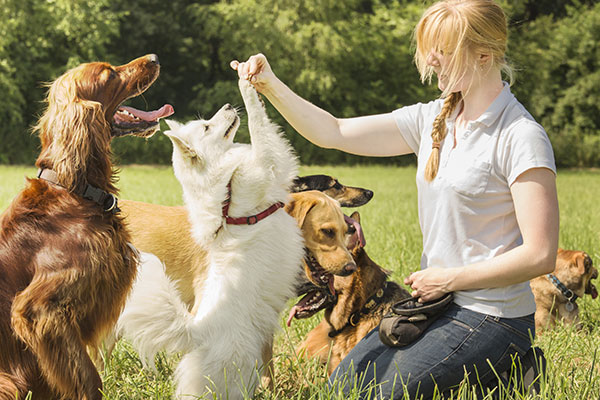Dog behaviourist near me: pricing and what to expect in consultations
Wiki Article
Comprehending the Function of a Veterinary Behaviourist in Pet Dog Training and Wellness
The duty of a vet behaviourist is crucial in attending to the detailed connection in between family pets and their proprietors. They integrate veterinary medicine with insights from pet actions scientific research to tackle problems like aggressiveness and anxiousness. Unlike standard fitness instructors, their approach focuses on the underlying reasons of these actions. This nuanced perspective questions about the efficiency of standard training approaches and how a much deeper understanding can change pet wellness. What methods do they utilize to achieve these results?What Is a Vet Behaviourist?
A veterinary behaviourist is a customized professional that concentrates on understanding and attending to the behavioral concerns of animals, specifically pet dogs. Their expertise incorporates vet medicine and pet behavior science, enabling them to detect and treat a vast variety of behavior problems - cat behaviourist near me. These specialists often hold innovative degrees, such as a Master's or PhD in animal habits, and are accredited by appropriate organizations, ensuring they possess a deep understanding of animal psychologyVet behaviourists evaluate pets via detailed monitoring and evaluation, thinking about factors such as genetics, setting, and training history. They establish customized habits adjustment plans, which may include desensitization strategies, positive support methods, and environmental adjustments. Cooperation with family pet proprietors is essential, as they offer advice and support throughout the training procedure. Eventually, the goal of a vet behaviourist is to enhance the health of the animal while cultivating an unified partnership in between family pets and their owners.
The Significance of Comprehending Animal Actions
Understanding animal actions is necessary for both pet dog owners and experts in the field of pet care, as it lays the foundation for effective interaction and training. Identifying how pets view their atmosphere and react to stimuli makes it possible for caregivers to develop an extra unified living situation. Understanding right into behavioral signs, such as body movement and articulations, cultivates more powerful bonds between family pets and their proprietors. By valuing the natural reactions and requirements of various varieties, individuals can tailor their training approaches to fit these factors, promoting better knowing and participation. Furthermore, a solid understanding of behavior scientific research aids in identifying stress factors and potential triggers, enabling proactive treatments. On the whole, recognizing animal behavior not only boosts the well-being of family pets however also improves the experiences of those that care for them, ultimately causing healthier, happier connections.Typical Behavioral Issues Addressed by Vet Behaviourists
Veterinary behaviourists frequently deal with usual behavior problems in pet dogs, consisting of hostility and concern feedbacks. They additionally concentrate on anxiety and stress and anxiety monitoring, which can greatly affect a pet's health. Comprehending these concerns is essential for establishing efficient training and treatment approaches.Aggression and Anxiety Actions
While lots of pet proprietors may view hostility and anxiety feedbacks as easy behavioral issues, these intricate responses frequently originate from underlying anxiety or previous injury. Vet behaviourists play a vital function in recognizing the root causes of these behaviors, which can materialize in different types, including growling, attacking, or extreme concern of particular situations. Comprehending these triggers is important for developing effective training approaches tailored per pet dog's one-of-a-kind scenarios. Behaviourists use techniques such as desensitization and counter-conditioning to help pet dogs handle their fears and aggression. Additionally, they inform family pet owners about proper monitoring methods, stressing the value of persistence and consistency. Resolving aggression and anxiety responses not just boosts the pet dog's lifestyle however also enhances the bond between family pet and owner.Anxiousness and Tension Monitoring
Anxiousness and stress are widespread concerns that lots of animals face, frequently resulting from modifications in their environment, absence of socialization, or previous adverse experiences. Vet behaviourists play a crucial function in identifying the underlying causes of these problems. They employ various methods, consisting of behavioral adjustment, desensitization, and counter-conditioning, to help pet dogs manage stress and anxiety. Furthermore, they may advise ecological modifications, such as developing safe areas or providing enrichment tasks that promote leisure. Partnership with pet dog owners is necessary, as behaviourists guide them in comprehending their animal's signals and applying efficient coping methods. By dealing with anxiousness and anxiety, vet behaviourists contribute greatly to improving the total health and top quality of life for pet dogs and their families.Just How Veterinary Behaviourists Vary From Typical Instructors
Veterinary behaviourists differ from standard fitness instructors primarily in their instructional histories and training. While conventional instructors usually concentrate on obedience and standard commands, veterinary behaviourists emphasize understanding and resolving underlying behavioral problems, incorporating medical factors to consider into their strategy. This distinctive focus permits them to give a more thorough therapy for pet dogs with complicated behavior obstacles.Education and Training Differences
Understanding the distinction in between veterinary behaviourists and standard instructors is crucial for animal owners looking for efficient training solutions. Vet behaviourists have postgraduate degrees in vet medication, typically adhered to by specialized training in animal behaviour. This education and learning furnishes them to deal with intricate behavioral issues that might stem from clinical problems or emotional variables. In comparison, conventional instructors normally have qualifications from training programs that concentrate on obedience and fundamental commands without diving into the go right here underlying psychological or medical facets. While both experts aim to improve family pet behavior, veterinary behaviourists can identify and deal with behavioural problems holistically, integrating medical understanding right into training techniques. This critical difference highlights the value of picking the ideal expert based on the pet's certain demands.Concentrate On Behavioral Issues
Attending to behavioral problems calls for a nuanced approach that identifies veterinary behaviourists from standard trainers. While typical fitness instructors usually focus on obedience and fundamental commands, veterinary behaviourists check out much deeper right into the underlying reasons for bothersome practices. They utilize a considerable understanding of pet psychology and therapy methods, which are rooted in scientific research. This experience enables them to determine issues stemming from anxiety, concern, or aggression, as opposed to merely addressing surface-level symptoms. On top of that, veterinary behaviourists assess the animal's general health, considering ecological elements and the pet's history. By incorporating clinical understanding with behavioural techniques, they supply tailored remedies that advertise long-lasting behavioural modification, making certain both the animal's and owner's top quality of life are substantially boosted.Medical Factors To Consider Included
While conventional fitness instructors might overlook hidden medical issues, vet behaviourists prioritize an extensive analysis of a pet's health and wellness as a fundamental step in dealing with behavioural problems. This strategy permits them to recognize possible clinical problems that might add to undesirable behaviours, such as anxiety, discomfort, or neurological disorders. By integrating clinical analyses into their method, veterinary behaviourists can team up with vets to guarantee an alternative understanding of the pet's wellness. In addition, they can advise proper therapies or changes to training strategies based on medical findings. This extensive point of view distinguishes veterinary behaviourists from traditional trainers, as they resolve both behavioral and health-related variables, eventually leading to more reliable and sustainable outcomes for family pets and their owners.
The Process of Collaborating With a Vet Behaviourist
Teaming up with a vet behaviourist includes a methodical technique to attending to a family pet's behavioral problems. The process starts with an extensive evaluation, where the behaviourist gathers thorough information regarding the pet's history, setting, and particular behaviors that are bothersome. This normally includes surveys, meetings with the family pet owner, and sometimes observations of the pet in its atmosphere.Complying with the assessment, the vet behaviourist creates a customized intervention plan that may consist of behavioral modification methods, training techniques, and, if necessary, referrals for clinical analyses. veterinary behaviour. The strategy is made to be functional and possible, making sure that it fits seamlessly into the pet dog owner's lifestyle
Succeeding follow-up sessions are vital to keep track of progress, readjust strategies, and offer assistance. This joint effort not only intends to modify unwanted behaviors yet additionally to improve the overall well-being of the pet dog, ensuring a harmonious partnership in between the animal and its proprietor.
Enhancing Your Family pet's Lifestyle With Behavioral Assistance
Enhancing a pet's lifestyle via behavioral support is important for cultivating a healthy and fulfilling relationship in between pet dogs and their owners (veterinary behaviour). Veterinary behaviourists play a vital duty in recognizing and addressing behavioral concerns that may prevent a family pet's health. Through customized techniques, they help alleviate anxiety, fear, and hostility, inevitably advertising a much more well balanced and delighted petBehavior assistance encompasses numerous techniques, including positive reinforcement, environmental enrichment, and socialization. By implementing these techniques, owners can produce a caring environment look at here now that encourages favorable actions. This not only enhances the family pet's psychological wellness however additionally reinforces the bond in between pet dog and proprietor.
Additionally, regular consultations with a veterinary behaviourist warranty that any kind of arising behavior issues are immediately resolved, avoiding acceleration. On the whole, buying behavior assistance is a proactive strategy that significantly enhances a family pet's life, causing improved physical and psychological wellness end results.
Frequently Asked Inquiries
What Qualifications Do Vet Behaviourists Possess?
Veterinary behaviourists commonly hold a veterinary degree, adhered to by specialized training in pet actions. Numerous additionally Get More Info possess accreditations from recognized companies, showing their knowledge in addressing pet behavior problems and advertising general pet health.Can Veterinary Behaviourists Recommend Medication for Pet Dogs?


Vet behaviourists, possessing vet levels and specialized training, can certainly recommend medication for animals. This ability enables them to resolve underlying behavior issues successfully, typically integrating pharmacological therapy with behavior alteration strategies for finest end results.
The Length Of Time Does Behavioral Treatment Commonly Take?
Behavioral treatment duration varies substantially, commonly varying from a few weeks to a number of months. Variables influencing this timeline include the family pet's certain concerns, uniformity of training, and the owner's involvement at the same time.Are Remote Assessments Available With Vet Behaviourists?

Exactly how Much Does a Vet Behaviourist Appointment Cost?
The price of a veterinary behaviourist appointment usually varies from $100 to $300, depending on variables such as location, experience, and session size. Added fees may get follow-up appointments or specialized solutions.Report this wiki page